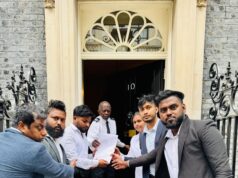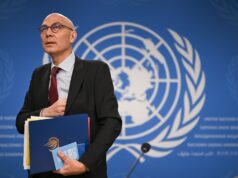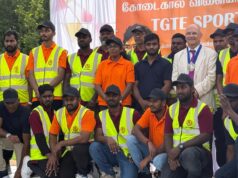
The UN High Commissioner for Human Rights presented a major report on Sri Lanka to the Human Rights Council, stressing that the country has a “historic opportunity” to break free from cycles of violence and impunity that have persisted for decades. The report calls for accountability, justice, legal and institutional reforms, demilitarization of the north and east, protection of human rights defenders, and urgent measures to address the country’s deepening economic crisis. It also urges the international community to support investigations, universal jurisdiction cases, and sanctions against those credibly accused of grave human rights violations.
Below is the complete speech delivered by the UN High Commissioner for Human Rights:
Excellencies, Sri Lanka today has an historic opportunity to heal from the cycles of violence and impunity that have dominated for decades. The government has a clear mandate from across the nation for transformative reform, accountability, truth, and justice. During my recent visit, the country’s leadership pledged a fresh direction on long-standing issues. It is crucial for this approach to be translated into a coherent, timebound plan for concrete action.
The report I’m presenting today sets out key areas for focus, including delivering accountability and justice, fundamental legal and institutional reforms, and eliminating the discrimination and division that have poisoned politics for generations. Mr. President, excellencies, first and foremost, my report calls for decisive action by the government on justice and accountability which are essential to fostering a future of healing, reconciliation, and sustainable peace.
I welcome the government’s pledge to take action on major long-standing issues, including strengthening the rule of law and ending ethnic discrimination and the politics of division. During my visit, I witnessed the continued suffering of victims of human rights violations and abuses. At a mass grave site at Chami Chana Chmani, I met a family who were searching for and grieving the loss of a loved one. A woman from a southern province told me that after 30 years, she is still looking for her husband. Independent, transparent, and credible investigations are critical to restoring trust.
My report notes that conflict-related sexual violence remains deeply stigmatized and many survivors feel completely abandoned. Impunity can be a second form of violence that perpetuates cycles of harm. The demands of victims and survivors must be addressed. Their voices must guide the government’s policies on accountability, truth, justice, and reparation. This calls for a formal acknowledgement of violations and abuses, including during the civil war.
Victims and survivors need the state and its security forces to accept responsibility and recognize the lasting impact of violations and crimes committed by them alongside those committed by non-state armed groups such as the LTTE. There must be a shared sense of the facts and a shared conviction that justice is being served. I welcome the president’s statements in this regard and the increased space for memorialization by victims.
Second, there is an urgent need for Sri Lanka to undertake deep constitutional, legal, and institutional reforms. This is crucial to ensuring that the tragedies of the past can never be repeated. I welcome the government’s initiative to establish an independent public prosecution office with independent investigators. It is important for civil society organizations to be included in this process. My report recommends setting up a dedicated judicial mechanism with an independent special council to look into violations of international human rights and humanitarian law over previous decades.
I urge immediate and sustained action to address deaths in custody and torture which remain systemic issues. And I strongly encourage legislative reform in relation to counterterrorism and civic space. Despite the government’s commitment to repeal the Prevention of Terrorism Act, arbitrary arrests and detentions under the law continue. I urge the government to impose an immediate moratorium on the use of this act.
My report also calls for the amendment or repeal of other laws or proposed laws that restrict fundamental rights, civil and political rights. These include the Online Safety Act, the International Covenant on Civil and Political Rights Act, the draft NGO Bill, and the draft Personal Data Protection Act. Despite an increasingly open civic space, my report describes ongoing persistent patterns of intimidation and harassment by security agencies of human rights defenders, victims’ groups, and independent journalists.
People working on accountability for enforced disappearances and those working on land disputes and environmental issues are particular targets. This underlines the need to change the mindset and practice of security agencies. There is an urgent need for comprehensive security sector reform, including the demilitarization of the north and east, the return of land, and the devolution of power to all levels of governance.
Mr. President, third, I welcome the new government’s declared commitment to economic and social justice. My report notes that many Sri Lankans are enduring extreme hardship after the worst economic crisis in living memory. Both the poverty rate and food prices have almost doubled in the past five years. Malnutrition and childhood stunting have increased by almost a third. Support for the Malaiyaha Tamil community needs to be a priority.
Sri Lanka’s debt situation remains concerning. This year’s budget allocated almost 60% of revenue to interest payments which are expected to remain high for the next decade. The imposition of new tariffs by the United States will also have a serious impact on the clothing sector, a cornerstone of Sri Lanka’s economy. My report welcomes the government’s efforts to strengthen the social safety net and to tackle corruption and economic mismanagement.
I hope this wave of change can be the basis for a new social contract and a transition towards a human rights economy in which all financial and budgeting decisions take the protection of human rights into account. I also urge external creditors to provide Sri Lanka with the fiscal space it needs to invest in its people and their economic, social and cultural rights.
Mr. President, international engagement through my office, through this council and the human rights mechanisms can play an important part in the change Sri Lanka so desperately needs. My office stands ready to assist Sri Lanka on this journey. One example of our work mandated by the council is the Sri Lanka Accountability Project through which we have built a secure repository of over 105,000 items of evidence, a critical resource for legal processes, justice and truth-seeking. I call on all member states to support this work.
I also call on them to cooperate in investigating and prosecuting alleged perpetrators of international crimes committed in Sri Lanka under principles of universal jurisdiction and to explore further sanctions against people credibly accused of gross violations of human rights. I encourage Sri Lanka to seek international assistance with the exhumation of mass graves and other investigations.
Together, the international community can support Sri Lankans to escape from the twin threats posed by persistent impunity and deep inequality. Thank you.






